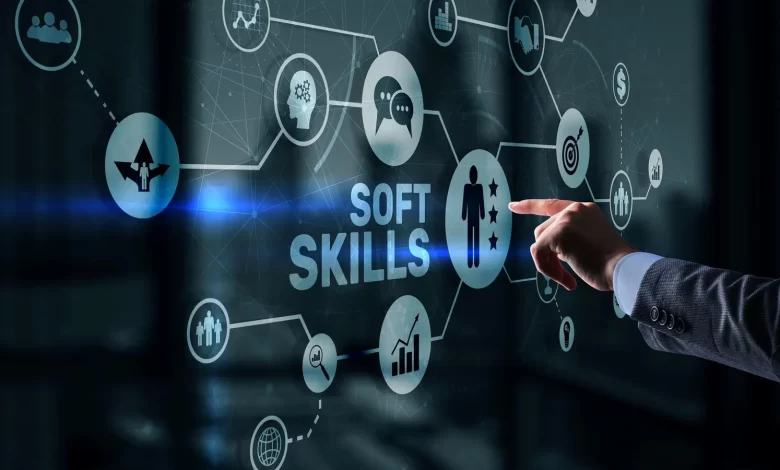
Soft skills are becoming increasingly valuable in the job market today. Unlike hard skills, which are specific, teachable abilities like programming or data analysis, soft skills encompass qualities such as communication, empathy, adaptability, and problem-solving. These traits are essential in fostering collaboration, driving innovation, and navigating complex social dynamics in the workplace. As technology continues to advance, particularly with the rise of artificial intelligence (AI), the importance of soft skills is amplified. This article explores why soft skills matter more than ever and how AI, including tools like AI cover letter generators, can help individuals highlight these essential traits.
Why Soft Skills Are Becoming More Important

1. The Shift Toward Automation and AI
As AI and automation technologies continue to develop, they are increasingly taking over tasks that require hard skills. Repetitive, rule-based jobs such as data entry, manufacturing, and even some aspects of financial analysis are being automated. This shift means that jobs requiring a high degree of human interaction, critical thinking, and emotional intelligence—areas where soft skills are paramount—are becoming more valuable.
- Impact: Employers are now looking for individuals who can complement AI tools by bringing creativity, empathy, and interpersonal skills to the table. The ability to communicate effectively, lead teams, and navigate complex social dynamics is increasingly seen as a differentiator.
2. The Rise of Remote and Hybrid Work Environments
The COVID-19 pandemic accelerated the adoption of remote and hybrid work models. In such settings, soft skills like communication, adaptability, and time management are crucial. Remote teams rely heavily on clear, concise communication to collaborate effectively, and adaptability is essential to navigate the ever-changing dynamics of remote work.
- Impact: As organizations continue to adopt flexible work models, the demand for employees who can demonstrate strong soft skills will likely increase. Companies are prioritizing those who can thrive in virtual environments, manage their time well, and maintain productivity despite physical distance from their teams.
3. Increased Focus on Diversity, Equity, and Inclusion (DEI)
Organizations are placing a greater emphasis on diversity, equity, and inclusion. To foster an inclusive workplace, employees need to demonstrate empathy, cultural competence, and the ability to work collaboratively with people from different backgrounds.
- Impact: Soft skills like active listening, empathy, and conflict resolution play a critical role in promoting a culture of inclusion. Employees who excel in these areas are better equipped to contribute positively to a diverse workplace, making these skills highly sought after.
How AI Can Help Highlight Soft Skills
While soft skills are crucial, they can be challenging to demonstrate, particularly on resumes and cover letters, where hard skills and quantifiable achievements often take center stage. AI tools, such as AI cover letter generators, can help job seekers effectively highlight their soft skills in several ways:
1. Personalizing Content with AI Cover Letter Generators
AI cover letter generators analyze job descriptions and match them with relevant experiences from a candidate’s background. They can suggest phrasing that emphasizes soft skills, such as teamwork, leadership, or communication, tailored to the specific job requirements.
- Tradeoffs: While AI-generated cover letters can save time and ensure relevant keywords are included, they may lack the personal touch and nuanced understanding that comes from human input. Job seekers should balance the efficiency of AI tools with the need to inject their own personality and authenticity into their applications.
2. Enhancing Emotional Intelligence Through AI Insights
AI tools can analyze text for tone, sentiment, and emotional cues, helping job seekers refine their language to convey empathy, enthusiasm, or confidence. For example, AI can suggest adjustments to phrasing that make communication more positive and engaging, demonstrating strong interpersonal skills.
- Tradeoffs: While AI can provide valuable insights, it might not always capture the full context of a candidate’s experiences or the cultural nuances required for certain roles. Over-reliance on AI for emotional cues can sometimes lead to a loss of genuine expression.
3. Leveraging AI for Skills Assessment and Development
AI-driven platforms offer assessments that can evaluate soft skills such as problem-solving, decision-making, and adaptability. These assessments can help job seekers identify their strengths and areas for improvement, allowing them to focus on developing the soft skills most relevant to their career goals.
- Tradeoffs: AI assessments can provide quick, data-driven insights into an individual’s skill set, but they may lack the depth and context of traditional methods, such as in-person evaluations or role-playing exercises. Moreover, the effectiveness of AI assessments may depend on the quality of the algorithms and data used to create them.
Challenges in Highlighting Soft Skills with AI

1. The Subjectivity of Soft Skills
Unlike hard skills, which are often quantifiable, soft skills are inherently subjective. For example, one person’s idea of “strong communication skills” may differ significantly from another’s. This subjectivity makes it challenging to accurately convey soft skills on a resume or cover letter, even with the help of AI.
- Challenge: AI tools must be carefully designed to understand the nuances of different soft skills and how they can be expressed in text. Without this understanding, AI-generated content may fail to capture the true essence of a candidate’s abilities.
2. Balancing AI with Human Insight
AI tools can be powerful in helping job seekers highlight their soft skills, but they should not replace human judgment and insight. AI-generated cover letters and resumes might lack the emotional depth or personal touch that human recruiters and hiring managers value.
- Challenge: Job seekers must find the right balance between leveraging AI for efficiency and ensuring that their unique voice and personal brand come through in their applications. They should view AI as a tool to enhance, not replace, their efforts.
3. Ensuring Fairness and Avoiding Bias
AI algorithms are only as good as the data they are trained on. If the data used to develop AI tools for recruitment contain biases, the AI may inadvertently reinforce these biases, making it harder for certain groups to have their soft skills accurately represented.
- Challenge: Developers and users of AI tools need to be vigilant about data quality and biases. Continuous evaluation and improvement of AI models are necessary to ensure fairness and inclusivity in highlighting soft skills.
Conclusion: The Future of Soft Skills and AI
Soft skills are more important than ever in a world increasingly dominated by technology and remote work. They are the key to thriving in dynamic, diverse, and tech-driven environments. While AI tools, including AI cover letter generators, can be incredibly useful in highlighting these skills, they are not a complete solution. The human element—context, empathy, and authenticity—remains critical.
For job seekers, understanding how to effectively use AI to complement their efforts is essential. By leveraging AI tools judiciously and maintaining a focus on genuine self-representation, they can navigate the complexities of today’s job market and ensure that their soft skills shine through. As AI continues to evolve, so too will its potential to help individuals highlight the qualities that make them stand out in the workplace.





